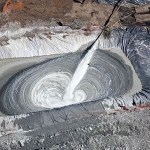
As fracking threatens to expand drilling in California, a coalition of environmental justice and community health groups sent a letter yesterday challenging the legality of the Central Valley Regional Water Quality Board’s plan to keep letting oil companies dump toxic drilling-mud waste throughout the valley with minimal safeguards.
Citing state environmental laws, the letter urges the water board not to move forward next month with a proposal to exempt drilling mud waste discharge from regulations. Drilling muds—used to facilitate drilling of oil and gas wells—contain scores of chemicals that can pose severe risks to human health.

“The water board will endanger the health of every person in the Central Valley if it gives these toxic drilling muds a free pass,” said Hollin Kretzmann, an attorney at the Center for Biological Diversity. “As fracking and acidization open new areas to oil drilling, the board has a duty to the people to protect our water and public health—not make it easier for oil companies to dump their dangerous waste without safeguards.”
“The valley already has the worst water quality in the state, and its low income and residents of color currently pay the outrageous price to secure safe water for their families,” said Sofia Parino, senior attorney at the Center on Race, Poverty & the Environment. “All Californians have a basic right to clean and safe drinking water, and failing to meaningfully regulate these dangerous drilling practices infringes upon it.”
Exposure to the chemicals contained in drilling muds can damage the skin, eyes and other sensory organs, liver, kidney and brain, as well as the respiratory, cardiovascular, gastrointestinal, immune and nervous systems.
About 4,680 new wells were drilled in California in 2012, according to state oil and gas officials, and the majority of the state’s oil production takes place in the Central Valley. Fracking, acidization and other unconventional oil-production techniques could dramatically raise the number of new wells in the area, according to some experts.
Drill cuttings, which mix with drilling mud and other boring waste, can also contain dangerous heavy metals such as aluminum, mercury, cadmium, arsenic, chromium, copper, lead, nickel and zinc.
In 2008 the board passed a five-year waiver from regulation for drilling mud discharge, exempting dischargers from reporting and monitoring requirements that apply to other types of waste discharge. That waiver is set to expire Dec. 4, but the board is proposing a new five-year waiver with minimal restrictions and without a study of the environmental and health risks of its waiver. Instead, the board is relying on a 32-year-old finding that drilling mud discharges will have “no adverse water-quality impacts.”
The group’s letter emphasizes the need to fully evaluate the environmental and health risks before approving blanket waivers, stating that “extending the waiver is inimical to the public interest and fails to comply with state law.”
The letter challenging the water board’s plan to continue a hands-off approach to toxic drilling mud was signed by the Association of Irritated Residents, the Center for Biological Diversity, the Center on Race, Poverty & the Environment, the Central California Environmental Justice Network, Physicians for Social Responsibility—Los Angeles, Communities for a Better Environment, Greenaction for Health and Environmental Justice, the San Joaquin Valley Latino Environmental Advancement Policy Project and the Sierra Club.
Visit EcoWatch’s FRACKING page for more related news on this topic.
——–

[source: http://ecowatch.com/2013/11/05/fracking-expands-board-refuses-to-regulate-waste/]

Leave a Reply
You must be logged in to post a comment.